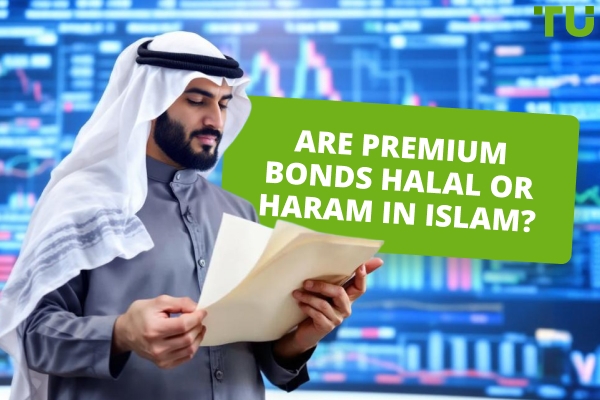Rules for Halal investing
Halal is an Arabic word that describes what is permissible or lawful for Muslims; whereas, haram, in contrast, describes what is forbidden. Adherents of Islam are increasing worldwide, so their interest in investments that are Shariah-compliant is likewise increasing. For Muslims, it is vital to ensure that their source of income is halal and not haram. Therefore, it is critical that their investments are made according to Islamic laws. In this article, the Traders Union will explain what "halal" investing means, the best halal investment options, and ways of investing that are lawful in Islam.
Top rules for halal investing
Halal investment is regarded as money invested while considering the principles of Islamic finance. Also, binary options are generally not considered halal because they involve high speculation and resemble gambling, which is forbidden in Islamic finance. The halal investing guidelines revolve around interest, debt, risk, and being socially responsible. According to Islamic principles, investors should get their share of profit and loss without receiving any interest, as interest is prohibited in Islam. Traders Union experts have prepared a detailed article on whether trading binary options is halal or haram.
Also, if a Muslim wants to invest in a company, he should first look at its financial activities and evaluate its business to make sure its source of income is halal.
Here are the top rules for halal investing:
-
Muslims cannot invest in companies that earn money through activities forbidden by Islam, such as gambling, alcohol, insurance, weapons manufacturing, pork or related products, or pornography.
-
According to some Islamic scholars, investing in companies working in the tobacco industry is also haram.
-
Any instrument involving interest, such as traditional bonds, should not be invested in.
-
Before investing, Muslims should analyze the balance sheet and profit and loss statement of a company to ensure their revenues are coming from halal streams.
-
Businesses that have very high debt — over 33% — are not eligible for investment.
-
A "5% rule" indicates that a company cannot invest more than 5% of its funds in haram sources. Any company with more than 5% of its revenues from haram is also not eligible for Muslim investment.
-
Businesses with accounts receivable of 45% or more than their annual assets are haram to Muslim investors.
What type of investing is haram?
Companies that are involved in activities that are forbidden by Islam are declared haram; consequently, investing in such companies by Muslims is also haram, and they cannot buy stocks in such companies. Examples of such off-limit industries include alcohol, tourism, banks, insurance companies, hotels, nightclubs, and pornography.
Some Islamic scholars say that a company might be considered "mixed" if it does halal business but has an interest-based account. Other scholars hold that they are entirely haram. There are a lot of controversies surrounding such companies, so it isn't easy to categorize them. As Muslims, it is preferred if you avoid such controversial investments and instead invest in companies and instruments that are non-controversial under Islamic law.
Short-selling or risky investments like options aren't allowed in Islam because they depend on luck or guessing what will happen in the future, which isn't possible, according to Islamic edicts.
Read also: Is copy trading halal or haram in Islam? in the TU article.
How to invest in halal assets
Here is a step-by-step guide on halal investing.
Stocks
The target stock should be halal.
Avoid companies dealing in the manufacturing of products declared haram by Islam.
Avoid risky stocks.
In case of compound interest, make sure your target asset is permissible.
Once halal conditions of the stock are met, make sure your stockbroker meets all the requirements of a halal broker as well and deals in halal stocks.
ETF Index funds
The buying mechanism of an index fund is the same as that of stocks.
Index funds consist of multiple stocks; thus, an investigation into all of the associated companies is required.
Forex trading
Forex trading sometimes involves using a swap account, which is not permitted by Islamic law due to the involvement of (next day, i.e., futuristic) speculation.
However, you can use swap-free accounts offered by Forex brokers.
Using swap-free Forex accounts can hold your position overnight without charging any interest or commission for the swap.
Cryptocurrencies
The acceptability of cryptocurrency remains a debatable topic in Islam.
The Accounting and Auditing Organization for Islamic Financial Institutions (AAOIFI) has approved some cryptocurrencies, thus making them Shariah-compliant.
To not have any interest involved, all the trades have to be made on the same day.
Make sure you are using a Shariah-compliant exchange and broker to invest your money in crypto.
Precious metals
Precious metals are the safest kind of investment.
They are Shariah compliant as speculations are not involved and give the maximum returns.
However, some scholars believe that only gold is safe to invest in, and other metals involve speculation, so Muslims should consult their Islamic scholars before deciding in which type of precious metal to invest.
Look at gold marketplaces or gold-backed EFTs to secure your money and maximize profits.
Real estate
This type of investment is tricky under the halal edict because many interests are involved in real estate and its transactions.
As an investor, there are certain things that you should evaluate. The first important thing is that the property being invested in is not being used for any activities that are haram.
The property you are investing in should not be leased and not be sold on credit.
Consult with an Islamic scholar to ensure all Islamic principles are being met.
Best Islamic (swap-free) accounts
Many Forex brokers offer swap-free accounts, and the numbers keep increasing. The Traders Union analyzed a few Islamic swap-free accounts, and below are the best ones that TU found:
eToro
eToro, a swap-free Forex broker, has a variety of accounts to meet the needs of different traders. The Islamic account is one of the account types that eToro provides. It is for traders who want to do business in a way consistent with Islamic law. There are no swap or rollover fees, and you can use this account to access a wide range of market instruments.
Through eToro's social trading, you can copy other investors’ successful trades. Moreover, it has a unique Islamic crypto wallet. It's worth the money you put into it and has many features, so it's the best Islamic swap-free account for online traders.
Also, it gives its clients flexibility because both the web platform and the app are easy to use and great for beginners.
FxPro
FxPro has been providing its services to clients worldwide since 2006. The leverage that FxPro's swap-free account gives is 1:500, which means that you can control a position that is larger than the limit of your account balance. However, be mindful that using leverage to trade is considered haram in certain circumstances.
FxPro also gives you protection against a negative balance, which means you can't lose more money than you put into your account. There are multiple trading instruments, such as indices and commodities. Also, it has more than 70 Forex pairs and more than 180 shares, cryptocurrencies, and futures. FxPro has more than 430 instruments, thus giving users various trading options.
FAQ
Is CFD trading halal?
CFD trading has been declared haram as you do not own the product; instead, it involves predicting the price of a commodity, which is against the rules of Islam. Moreover, CFD also involves using leverage, which Islam does not permit. However, according to some Muslim traders, by using swap-free accounts, CFDs can be halal as interest will not be involved.
Who are the best halal brokers?
Muslims should use swap-free brokers. For Muslims, there are several swap-free halal brokers available. Please read our review of the best swap-free accounts if you want to learn more about them.
In what cases is leverage haram?
Using leverage to trade is considered haram. But if an organization or platform uses its money to help other people, it will be seen as halal.
What kind of investments should I make?
Your kind of investment should reflect your values and your community’s values. In this way, you will be contributing to the world while making a profit at the same time.
Glossary for novice traders
-
1
Index
Index in trading is the measure of the performance of a group of stocks, which can include the assets and securities in it.
-
2
Investor
An investor is an individual, who invests money in an asset with the expectation that its value would appreciate in the future. The asset can be anything, including a bond, debenture, mutual fund, equity, gold, silver, exchange-traded funds (ETFs), and real-estate property.
-
3
Cryptocurrency
Cryptocurrency is a type of digital or virtual currency that relies on cryptography for security. Unlike traditional currencies issued by governments (fiat currencies), cryptocurrencies operate on decentralized networks, typically based on blockchain technology.
-
4
Forex Trading
Forex trading, short for foreign exchange trading, is the practice of buying and selling currencies in the global foreign exchange market with the aim of profiting from fluctuations in exchange rates. Traders speculate on whether one currency will rise or fall in value relative to another currency and make trading decisions accordingly. However, beware that trading carries risks, and you can lose your whole capital.
-
5
Social trading
Social trading is a form of online trading that allows individual traders to observe and replicate the trading strategies of more experienced and successful traders. It combines elements of social networking and financial trading, enabling traders to connect, share, and follow each other's trades on trading platforms.
Team that worked on the article
Alamin Morshed is a contributor at Traders Union. He specializes in writing articles for businesses that want to improve their Google search rankings to compete with their competition. With expertise in search engine optimization (SEO) and content marketing, he ensures his work is both informative and impactful.
Olga Shendetskaya has been a part of the Traders Union team as an author, editor and proofreader since 2017. Since 2020, Shendetskaya has been the assistant chief editor of the website of Traders Union, an international association of traders. She has over 10 years of experience of working with economic and financial texts. In the period of 2017-2020, Olga has worked as a journalist and editor of laftNews news agency, economic and financial news sections. At the moment, Olga is a part of the team of top industry experts involved in creation of educational articles in finance and investment, overseeing their writing and publication on the Traders Union website.












